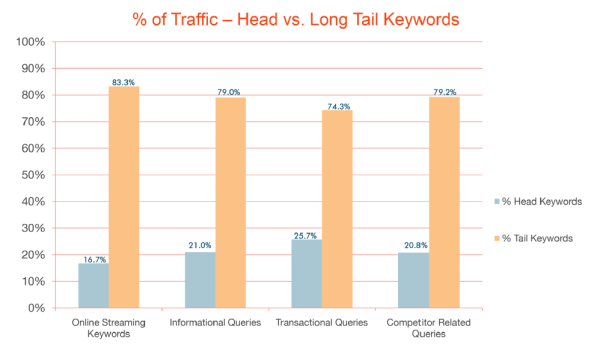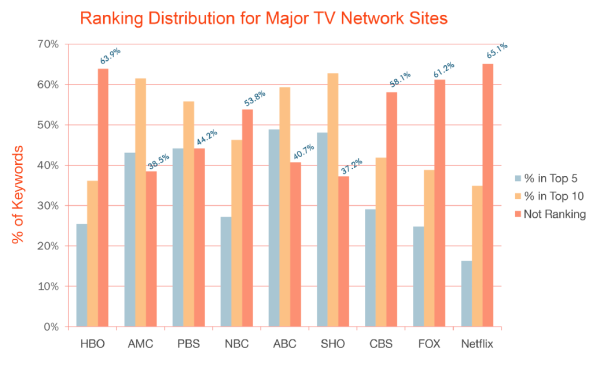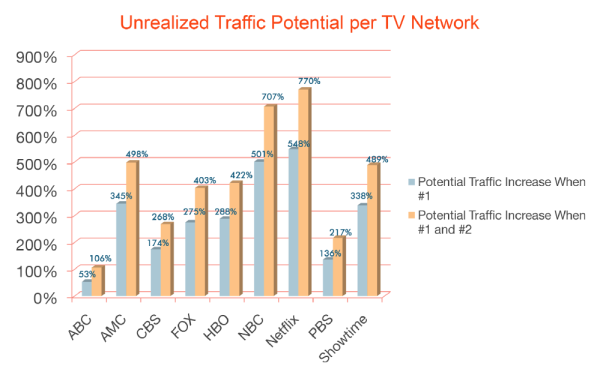Study: TV Networks Not Ranking In Key SERP Positions, Losing Valuable Search & Traffic Opportunities
After evaluating the organic search performance of America’s most popular television networks, SEO research firm RankAbove discovered a majority of the networks are missing out on significant search and traffic opportunities. The study examined four key areas of search including keywords, rankings, traffic potential and Universal SERPs. According to the findings, not only are a […]

According to the findings, not only are a number of networks performing poorly in their SEO efforts, some are actually performing worse than they were a year ago.
Keyword Analysis
The keyword analysis portion of the study categorized keywords related to 23 Emmy award winning shows from nine different networks into four separate groups: online streaming (keywords associated with a desire to watch a show online), information queries (keywords used to find information about a particular show), competitors (keywords involving an online streaming competitor, like YouTube or Sidereel), and transactional (keywords representing series-related products (for example, “Glee poster”).
The percent of traffic for head keywords (shorter, more general terms) was much less than the percent of traffic for long-tail keywords (longer, more specific phrases). With long-tail keywords earning nearly 75 percent or more of the traffic across all groups, network websites have plenty of room to capitalize on long-tail keywords to gain better rankings and capture more of the market.
According to the study, “…the larger the relative size of the long tail market, the more ranking opportunities there are with lower competition and the greater the ease for network sites.”
Network Website Rankings
Using keywords defined during the keyword analysis portion of the study, RankAbove evaluated how networks ranked when searching on phrases specific to the series owned by each network. The findings show that a number of networks fail to rank until the second page of search results – which the study defines as “not ranking” – for more than 60 percent of phrases associated with their series.
Showtime, ABC and AMC received honorable exceptions in this area, all ranking in, at least, the top five positions for a relatively high number of searches. Comparing data from 2012, these three channels have all improved their rankings since last year, while CBS, FOX and HBO are currently ranking worse for their targeted phrases than they ranked in 2012.
Potential Traffic To Be Gained With Improved SEO Efforts
After identifying the sites with the lowest rankings, the study cross-referenced the ranking results with an external CTR study and exact-match keyword data pulled from the Google AdWords keyword tool to identify the potential traffic network sites could gain if they were to push their SERP rankings up to the No. 1 and No. 2 positions.
The possible outcomes of moving from current ranking positions to the top two SERP positions are significant, with over half the network sites having the potential to increase their traffic by 400 percent or more. The study notes that while these numbers reflect a sizable untapped resource for network sites, they also offer, “Huge opportunities for smaller and more mobile players that can get onto the same SERPs through a combination of fast and efficient on-page and off-page search engine optimization strategies.”
Taking Advantage Of Universal SERPs
Universal search results offer a unique opportunity for networks to appear on the first page of relevant searches; yet, many networks are not taking full advantage of what Universal search has to offer. While the majority of the network series keywords that contain Universal SERP listings include video results, not one network appears in Universal News results on the organic SERPs. As the study points out, “This represents a significant missed opportunity,” since Universal listings have a stronger visual appearance and can be counted on to provide higher CTRs.
Contributing authors are invited to create content for Search Engine Land and are chosen for their expertise and contribution to the search community. Our contributors work under the oversight of the editorial staff and contributions are checked for quality and relevance to our readers. The opinions they express are their own.
Related stories
New on Search Engine Land




